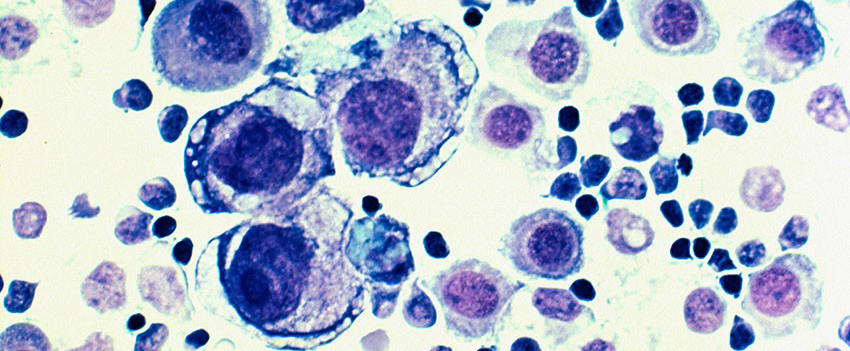Blood Enzyme Activity Level May Indicate Which Breast Cancers Are Slow Growing
Media contact: Nicole Fawcett, 734-764-2220 | Patients may contact Cancer AnswerLine™, 800-865-1125
SWOG researchers demonstrated that a blood serum test can identify which patients with metastatic hormone receptor-positive breast cancer have slow-growing disease that might be controlled with a simple aromatase inhibitor pill alone.

PORTLAND, OR ‐ Researchers with the SWOG Cancer Research Network have found that patients with metastatic hormone receptor-positive breast cancer who have low activity levels of the enzyme sTK1 in their blood serum at the start of anti-estrogen treatment live longer and go longer without their disease progressing than patients with high levels.
The results suggest that patients with low sTK1 activity levels have slow-growing disease that can be controlled initially with single-drug endocrine therapy for a prolonged period. It remains to be determined whether these patients gain further benefit from adding a CDK4/6 inhibitor to their endocrine therapy.
The findings come from an analysis of serum samples from 432 women with breast cancer who took part in the S0226 clinical trial, which was conducted by the SWOG Cancer Research Network, a cancer clinical trials group funded by the National Cancer Institute (NCI), part of the National Institutes of Health (NIH). Results are published today in Clinical Cancer Research, a journal of the American Association for Cancer Research.
“SWOG researchers have demonstrated that a blood serum test can identify which of these patients have slow-growing disease that might be controlled with a simple aromatase inhibitor pill alone,” said Dr. Lajos Pusztai, M.D., DPhil, professor of medicine (medical oncology) at Yale Cancer Center, who is a co-author on the paper.
Study S0226 found that most women with metastatic hormone receptor-positive breast cancer who have not had previous treatment for their metastatic breast cancer live longer when they get a combination of the endocrine therapy drugs anastrozole and fulvestrant than when they get just anastrozole.
However, not all patients see extra benefit from the combination; some do just as well on a single drug. Having a way to identify which patients would not derive added benefit from the combination could save these patients the additional side effects and extra costs associated with taking two drugs instead of one.
The work was led by Costanza Paoletti, M.D., who was then with the University of Michigan Rogel Cancer Center. She and her colleagues measured the level of serum thymidine kinase 1, or sTK1, considered a marker of cellular proliferation, in 1,726 samples taken from S0226 patients before the start of their treatment and at four time points during treatment. The samples were evaluated using a commercially available test known as the DiviTum assay, produced by Biovica International of Uppsala, Sweden, which measures levels of the enzymatic activity of sTK1. The researchers found what were considered high levels of the enzyme in samples from 171, or 40 percent, of the patients.
Patients with high sTK1 levels, either before treatment or at any time during treatment, tended to have a significantly shorter period of time before their disease advanced (progression-free survival time, or PFS). Those with high levels at the start of treatment, or baseline, had a median PFS of only 11.2 months compared to 17.3 months for patients with low levels at baseline. The high-sTK1 patients also died sooner, on average, than patients with low levels of the biomarker, with median overall survival times of just 30 months versus 58 months.
Importantly, patients with low sTK1 levels did just as well on the single drug anastrozole as on the combination. This means a measurement of pretreatment sTK1 level could potentially be used to determine whether a patient should start treatment with two-drug endocrine therapy (high sTK1) or a single-drug endocrine therapy (low sTK1).
The researchers also called for more investigation into whether low sTK1 levels could further indicate which patients could be spared having targeted therapy drugs added to their endocrine therapy.
Daniel Hayes, M.D., also of the University of Michigan Rogel Cancer Center and a co-author on the paper, says, “These results should serve as the basis for future clinical studies to distinguish patients with estrogen receptor metastatic breast cancer who might be best treated with endocrine therapy alone versus those who should receive endocrine therapy plus an ancillary treatment, such as CDK4/6, mTOR, or PIK3CA inhibitors. Each of these has been shown to complement endocrine therapy, but each is associated with additional side effects and costs.”
This research was supported by NIH/NCI grants CA180888, CA180819, U24CA196175, and CA196175 and in part by AstraZeneca. Biovica International provided funding for the sTK1 testing.
In addition to Paoletti, Pusztai, and Hayes, other authors on the paper include William E. Barlow, PhD, of the SWOG Statistical and Data Management Center; Erin F. Cobain, MD, of the University of Michigan Rogel Cancer Center; Mattias Bergqvist, Bsc, of Biovica International; Rita S. Mehta, MD, of the University of California Irvine Medical Center; Julie R. Gralow, MD, of the Seattle Cancer Care Alliance and the University of Washington Medical Center; Gabriel N. Hortobagyi, MD, of the University of Texas MD Anderson Cancer Center; Kathy S. Albain, MD, of the Loyola University Chicago Stritch School of Medicine; Priyanka Sharma, MD, and Andrew K. Godwin, PhD, both of the University of Kansas Medical Center; Alastair M. Thompson, MD, of the Baylor College of Medicine; and James M. Rae, PhD, of the University of Michigan Rogel Cancer Center.
SWOG Cancer Research Network is part of the National Cancer Institute's National Clinical Trials Network and the NCI Community Oncology Research Program and is part of the oldest and largest publicly funded cancer research network in the nation. SWOG has nearly 12,000 members in 47 states and seven foreign countries who design and conduct clinical trials to improve the lives of people with cancer. SWOG trials have led to the approval of 14 cancer drugs, changed more than 100 standards of cancer care, and saved more than 3 million years of human life. Learn more at swog.org.
